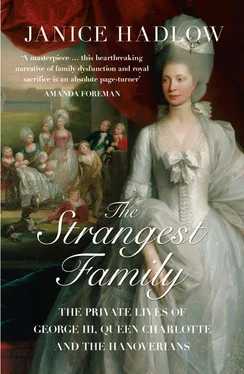When George III became monarch, the family had been somewhat reluctantly seated on the throne for only forty-six years. The crown of Great Britain had not been a prize they had expected to inherit, but they had done so with the death of Queen Anne in 1714. Anne was the daughter of James II, the last Stuart king, who was forced off his throne in 1688 when his Catholicism became unacceptable to the Protestant English. In the Glorious Revolution that followed, the Dutch prince William of Orange, nephew and son-in-law of the deposed James, was invited to become king, with the stipulation that henceforth, only a Protestant could become sovereign, a qualification still in force today. Anne, who succeeded the childless William, was known with cruel irony as ‘the teeming Princess of Denmark’. Her pregnancies were many, but, despite an appalling catalogue of gynaecological endurance, she had no living children to show for it; she lost five babies in infancy and suffered thirteen miscarriages. When her only surviving child, the eleven-year-old Duke of Gloucester, died in 1700, it was clear that an heir must be looked for elsewhere.
The defenders of the Glorious Revolution did not find it easy to identify a suitably qualified candidate. Catholicism ruled out James II’s exiled son, who had otherwise by far the strongest claim, as well as fifty-six other religiously unacceptable potential heirs. Eventually, it was decided to offer the crown to Electress Sophia of Hanover. A daughter of Charles I’s sister Elizabeth, in purely dynastic terms her claim was weaker than those of many more directly related contenders, but her impeccable Protestant credentials won the day, and it was her name and that of her descendants which was enshrined in the Act of Settlement of 1701 as heirs to the crown if Queen Anne should die without a child. When Anne’s health, exhausted by a lifetime of fruitless childbearing, fatally gave out in 1714, the electress was already dead, so the succession passed to her eldest son, George Louis. He was crowned in London later that year as George I.
It was not an entirely popular choice. The Jacobites – supporters of the old Stuart monarchy – rioted in at least twenty English towns. It was worse in Scotland, still smarting with outraged national grievance at the Act of Union, which linked the nations together in 1707, and whose simmering discontents erupted into the uprisings of 1715 and 1745. Although on those occasions it looked as if Hanoverians might be forced back to the electorate that was always their first love, they hung on, somewhat despite themselves, and it was their dynasty that ruled Britain until the death of George III’s son, William IV, in 1837.
As a child, the diarist Horace Walpole, who wrote so voluminously about George I’s successors, had a brief encounter with the first of the Hanoverians. His father, Sir Robert Walpole, was George’s first minister, and as such was able to gratify for his son ‘the first vehement inclination that I ever expressed … to see the king’. He was taken in the evening to St James’s Palace and, after supper, informally introduced to the monarch. The ten-year-old Horace ‘knelt down and kissed his hand, he said a few words to me, and my conductress led me back to my mother’. Writing nearly seventy years later, Walpole recalled that ‘the person of the king is as perfect in my memory, as if I saw him but yesterday. It was that of an elderly man, rather pale and exactly like his pictures and coins; tall; of an aspect rather good than august; and with a dark tie wig, a plain coat, waistcoat and breeches of a snuff-coloured cloth, with stockings of the same colour, and a blue riband all over.’ He had, he thought in retrospect, been remarkably indulged, for the king ‘took me up in his arms, kissed me and chatted some time’. 2
Walpole, who in later life liked to think of himself as almost a republican, and who observed that he had ‘never since felt any enthusiasm for royal persons’, was clearly captivated. But there was another side to the king who seemed so kind and genial to the starstruck small boy. For it was George I who must bear much of the responsibility for nurturing the tradition of Hanoverian family hatred that was to bequeath such a miserable inheritance to future generations.
*
George I’s own experience of family life was hardly a happy one. His father, Ernst August, was a man of calculating ambition, dominated by the all-pervasive desire to see his dukedom of Hanover elevated to the far greater status of an electorate. His many children were raised in an atmosphere of military discipline, expected to display absolute obedience to his will and utter devotion to the grand project of dynastic consolidation. He seldom saw any of them alone or in informal circumstances; unsurprisingly, they were said to be ‘solemn and restrained’ in his presence. 3Ernst’s wife Sophia, whose antecedents were ultimately to bring the crown of Great Britain into the family’s possession, was a far more relaxed and sympathetic character than her unbending husband – Walpole described her as ‘a woman of parts and great vivacity’ – but she too submitted without question to her husband’s severe dictatorship. 4Any resistance on her part had been undone by love. She had expected very little from her arranged marriage, and when, against all her expectations, Ernst proved a passionate and enthusiastic lover, Sophia could not believe her luck. From her wedding night onwards, for the rest of her life, she was completely in thrall to her husband’s judgement, never venturing to set her own considerable intellect against any of his schemes. Ernst’s numerous affairs with other women caused her much pain – in middle age, she wrote sadly that she could not believe she had ever been so foolish as to imagine he would remain faithful to her for ever – yet she fought hard to preserve her primacy in his eyes. She was much tried by his long relationship with the malicious Countess von Platen, who subjected her over many years to a litany of carefully calculated public insults; but Sophia’s commitment to the errant Ernst August never wavered. She once declared that she would ‘gladly have followed him to the Antipodes’. 5
Sophia’s dogged devotion won her no part at all in her husband’s political strategising. He acknowledged the sharpness of her mind but denied her any active role in his schemes. She was ‘without influence’ in family affairs and allowed no say in the making of even the most significant decisions. When Ernst decided to disinherit his many younger sons in order to consolidate all the family possessions in the hands of George, the eldest, Sophia could do nothing to protect their interests. Angry and betrayed, three of the brothers left Ernst’s court and signed on as soldiers in the Imperial service. Within a few years, all had died in battle, to the despairing grief of their mother. She was equally powerless when Ernst began to make marriage plans for the favoured George. Ernst had long before decided that his eldest son would marry his cousin, Sophia Dorothea of Celle, thus uniting two branches of the family dukedoms into a single greater state.
For all its desirability as a political alliance, it was obvious to anyone who knew them that George and Sophia Dorothea were hardly well matched. Sophia Dorothea, who was only eleven when the marriage was first proposed, had been brought up from her earliest days in a relaxed atmosphere of indulgence and luxury. Her father, a very different man from his single-minded brother Ernst, had married for love a woman considered beneath him in the complicated gradations of princely hierarchy, and had sacrificed the opportunity for further aggrandisement as a result. Sophia Dorothea, the only child of this love match, grew up into a beautiful woman – sophisticated, conscious of her attractiveness, and considered very French in her tastes. She loved to be amused and entertained, and was said to be obsessed by fashion. Lively and good-looking, she had no shortage of suitors. Her prospective mother-in-law regarded her balefully; she was sure she would not find a soulmate in her reserved and cautious eldest son.
Читать дальше












